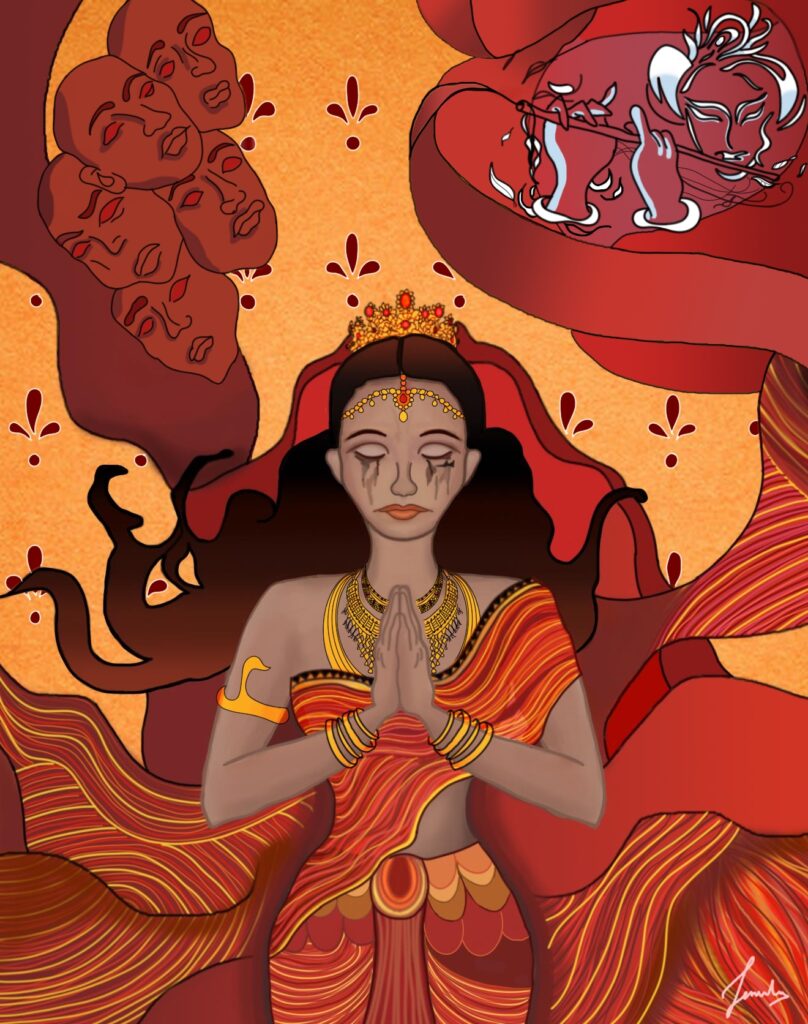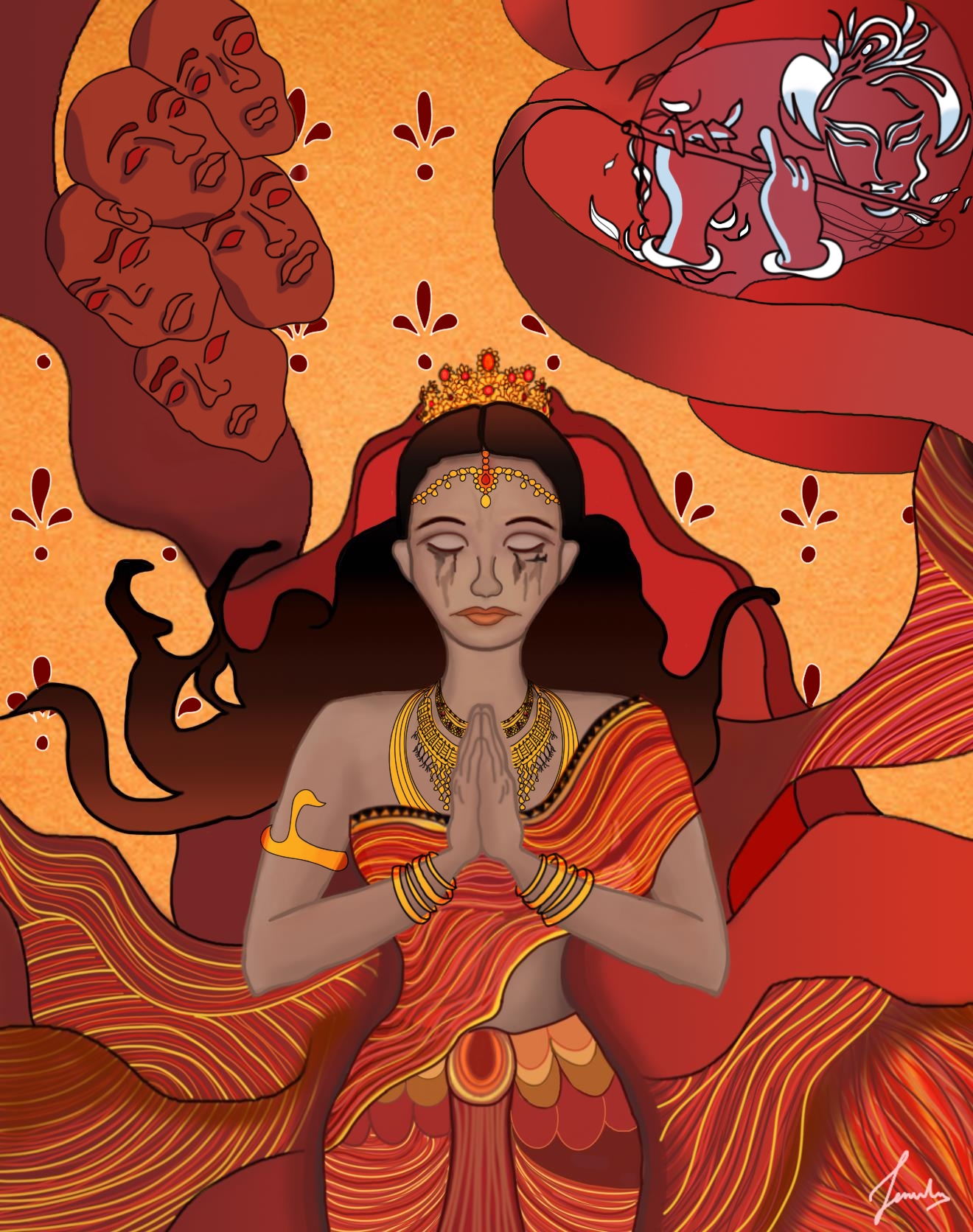
“Between men and women, there is no friendship possible. There is passion, enmity, worship, love, but no friendship.”
An old statement by Oscar Wilde, a belief most people consider accurate—a misconception.
Mythology has a wicked way of teaching us the dos and don’ts of life. These tales also portray the platonic love and trust between a man and a woman— the stories of Draupadi and her ‘Sakha,’ Lord Krishna—one considered to be impossible.
Amid the treachery, greed, and casual cruelties looming over the stories of Mahabharata, Krishna and Draupadi’s spiritual bonding is one of the few things offering respite to the readers. Littered across the entirety of the epic are stories that depict the intimate relationship between the two.
Amongst the five kings and their 100 cousins, the Panchala Princess got caught up in a whirlwind of mind games—each one designed to put the other down. Would she have ever thought marrying the five brothers would lead to a relationship between her and 105 egos? Did she ever imagine the repercussions of being a part of a family that would strip her of her femininity? Who would have thought a friend, her Sakha, would stand by her when no one else could; no one else would?
The Kauravas extended an invitation to play dice—an invitation to humiliation, an invitation never to be accepted. The 100 brothers had an advantage over The Pandavas. They had a mastermind player by their side; Shakuni was anything but naive. Draupadi understood the carefully set up trap when she entered the Sabha. However, her pride did not allow her to stop the game that was about to unravel.
Two rounds into the gamble, Yudhishthir realized his cousins were playing an unfair game. “This is impossible. You have devised a cunning plan; those dice are not normal!” Shakuni, being his crafty self, cleverly dismissed the eldest Pandava’s exclamation, retorting that there was no proof.
As the games proceeded, Dharmaraja lost all his prized possessions. Duryodhana extended another offer, “You have nothing left, how will you bet now? I will give back everything to you if you play this last gamble and win. Prove me wrong, oh, cousin! There is one other thing you own.” Draupadi knew what the next bet was. Her husband had lost his kingdom, his luxuries, his treasure, and his brothers. However, she had a sliver of hope that maybe he would forfeit now, that he would stop the game and accept defeat. Yet, the next words he uttered shattered all her hopes.
Even before the dice rolled out, the fiery queen felt dread settle over her. Her king was going to lose. She was aware of the consequences. She braced herself for the unpleasant event that would follow. She was numb; she was in shock.
The sequence of events that followed was a blur to her. She did not understand when Dussasana grabbed her hair, nor did she feel her undraped saree. The only clear thought that ran through her was a plea.
“Oh, Hari, Lord of the three worlds! Save me, for I am drowning in the ocean of the Kauravas. Save me, for I am losing my senses. Save me, for I am distressed. Save me, for no one else in the Kursabha would.” Her eyes shut, blocking out all the eyes on her; Draupadi kept chanting the same prayer repeatedly.
A surplus amount of saree wrapped around her. The cloth that covered her body was boundless. She opened her eyes to the red ones of her friend. At that moment, she understood; this was Lord Krishna returning the small favour she tied around his wound years ago. A piece of cloth; the metaphor for a Rakhi. In that instance, she understood the depth of their friendship. The limitless saree became the infinite love connection between them.
Years later, Draupadi peeped through the little window in the kitchen to get a glimpse of a crowd of men marching towards her hut. Warding off the smoke from her way, she got down to work. From holy sages to soldiers from far-off lands, the small place brimmed with visitors almost every day. Even though they were in exile, Draupadi found it to be uncouth to let guests go hungry from her door.
Making the most out of the meagre supplies her husbands could find in the forest, she proved her dexterity in cooking. After toiling in the kitchen for hours and serving the guests, she let out a deep sigh.
“The mouth-watering delicacies, the sweets dripping with caramel, the servants’ laughter, and the aroma enveloping the royal kitchen. Oh! How much I wish I could have the privilege of Panchal’s tranquil life,” Draupadi thought to herself.
The thought of running out of food while having visitors plagued the Panchal princess ever since entering the forests. She chose to suffer in silence, and nobody noticed or cared enough. Sometimes, one of the Pandavas would laud her for her service and call her an “ideal wife”. Draupadi could only manage a wry smile, followed by an uncomfortable silence. One day, as the army of Krishna visited the cottage, her nightmares came to life.
Overturning all the containers, scrutinizing all the corners of the kitchen, Panchali went into paranoia as not a single grain could be found. Overwhelmed with shame, she started weeping on the floor. Krishna, sensing her predicament, went into the kitchen.
“Sakhi! What is troubling you?” asked Krishna. Struggling with her pent-up emotions, she burst out. “There is not even a single grain of food in this house, Krishna. What will I serve your exhausted soldiers?”
She held up an empty vessel as proof of her disappointment. A tender smile decorated the God’s face. He picked up the single grain of rice stuck at the bottom of the vessel and ate it. At that moment, and for that day, the entire universe became satiated.
“My soldiers are no longer famished, and neither is the universe. Wipe your tears, Sakhi. From now on, this vessel will be known as the Akshay Patra. It will give you unlimited food every day until you have finished eating.” Krishna said before adding, “Take it as a small token of gratitude for a devoted queen like you.” Draupadi thanked her Sakha.
In today’s time, the inexhaustible vessel is known as Akshay Patra. It gave rise to the festival, ‘Akshay Tritiya,’ signifying the third day of unending prosperity.
Blood of the covenant is thicker than the water of the womb. Lord Krishna eased Draupadi’s discomfort when others paid no heed to it. Relations do not guarantee loyalty, actions do.
Some folktales say that Krishna and Draupadi bonded telepathically. A striking similarity between the two strong-headed souls was their prominent role in fueling the war’s rage.
When Draupadi was born from the spiritual flames of yajna, it was forecasted that she would be the Kshatriya warriors’ doom. The attempt to disgrace Panchali in Duryodhan’s court was the turning point which led the Pandavas to seek vengeance.
Although Krishna never wished for war, he could not help but accept its inevitability. From choosing Arjun over Duryodhan to breaking his vow to kill Bhishma with his chakra, it is crystal clear that the fate of Mahabharata revolved mainly around Krishna’s decisions.
Relations bring with it a black and a white side. The vow to protect someone or something could lead to unimaginable consequences. Mahabharata is one such epic of Hindu mythology that will never stop saying what it has to say. New meanings and theories will always leave us questioning the morality of even the most righteous of characters. However, one belief will remain unchanged in the end. Krishna and Draupadi had a significant role in the war, maybe even more so than the cousins.
Written by Shranya Shrivastava and Archana S for MTTN
Edited by Kaavya Azad for MTTN
Featured Image by Jenrita Castelino for MTTN

Leave a Reply
You must be logged in to post a comment.